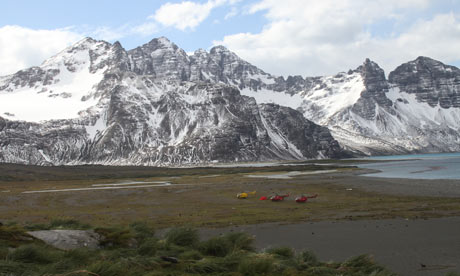Welcome to DU!
The truly grassroots left-of-center political community where regular people, not algorithms, drive the discussions and set the standards.
Join the community:
Create a free account
Support DU (and get rid of ads!):
Become a Star Member
Latest Breaking News
General Discussion
The DU Lounge
All Forums
Issue Forums
Culture Forums
Alliance Forums
Region Forums
Support Forums
Help & Search
Science
Related: About this forumWorld's largest rat extermination returns South Georgia to its bird life

Three helicopters encountered perilous flying conditions while peppering the southern Atlantic island with 183 tonnes of the poison Brodifacoum. Photograph: Roland Gockel
A team on South Georgia have successfully completed the world's largest rodent eradication in an effort to rid the British territory of millions of rats and mice.
Against the backdrop of an approaching Antarctic winter between February and May, three helicopters encountered perilous flying conditions while peppering the southern Atlantic island with 183 tonnes of the poison Brodifacoum. The team of 25 baited an area of 224 sq miles (580 sq km). The area targeted dwarfed the previous largest rodent eradication, on New Zealand's Campbell Island, by five times.
The project director, Prof Tony Martin, said the team, managed by the Dundee-based South Georgia Heritage Trust, aimed to return the 104 mile (167 km) long island to the millions of seabirds wiped out by rats and mice introduced by 19th- and 20th-century whalers and sealers.
"South Georgia, before man came along, was probably the most important bird breeding island in the world. And it is no longer anything close to that," he said. Probably less than 1% of the original population of burrowing seabirds remains, Martin said.
http://www.guardian.co.uk/environment/2013/jul/04/worlds-largest-rat-extermination
InfoView thread info, including edit history
TrashPut this thread in your Trash Can (My DU » Trash Can)
BookmarkAdd this thread to your Bookmarks (My DU » Bookmarks)
3 replies, 1528 views
ShareGet links to this post and/or share on social media
AlertAlert this post for a rule violation
PowersThere are no powers you can use on this post
EditCannot edit other people's posts
ReplyReply to this post
EditCannot edit other people's posts
Rec (3)
ReplyReply to this post
3 replies
 = new reply since forum marked as read
Highlight:
NoneDon't highlight anything
5 newestHighlight 5 most recent replies
= new reply since forum marked as read
Highlight:
NoneDon't highlight anything
5 newestHighlight 5 most recent replies
World's largest rat extermination returns South Georgia to its bird life (Original Post)
dipsydoodle
Jul 2013
OP
Champion Jack
(5,378 posts)1. Then, how do they get rid of the poison?
Paulie
(8,462 posts)2. Persistence: brodifacoum is persistent in soils with a half-life of 157 days.
So says this site below. The OP mentions that land mammals are not indigenous to the island and the locations not covered by ice are smaller.
http://www.abcbirds.org/abcprograms/policy/toxins/Profiles/brodifacoum.html
Igel
(35,317 posts)3. Moreover it wouldn't be a problem if the poison persisted for years.
If the birds don't eat it, who much cares? Not much else there.
Sea birds eat fish.
Seals eat fish.
If the poisoned mammals all run off into the sea, well, the sea's a big place and the poison would be (a) metabolised by something and (b) diluted below minimum required strength.
A small number of seabirds would ingest some of the poisonous mammals. A small price to pay for eradication of the vermin.